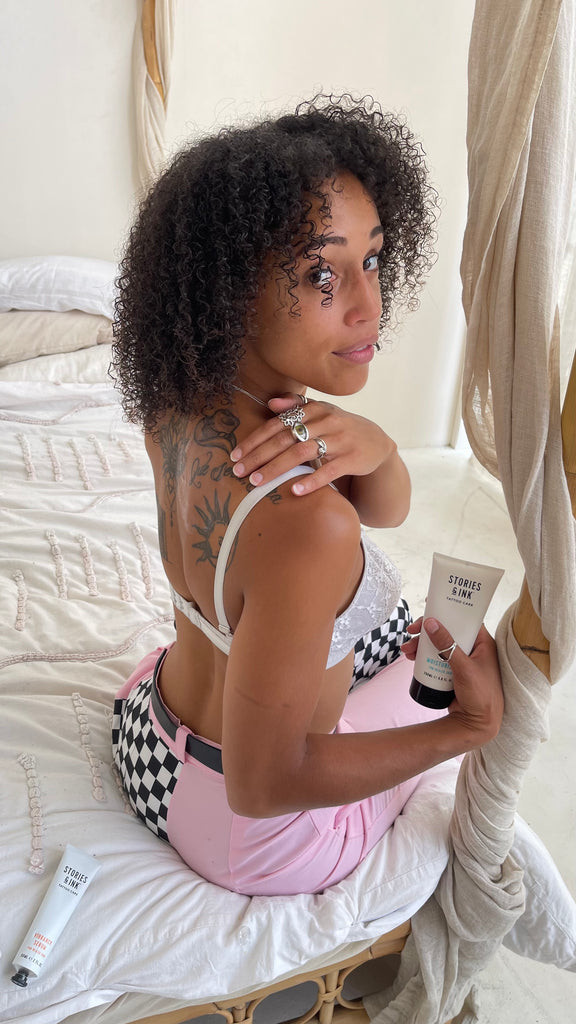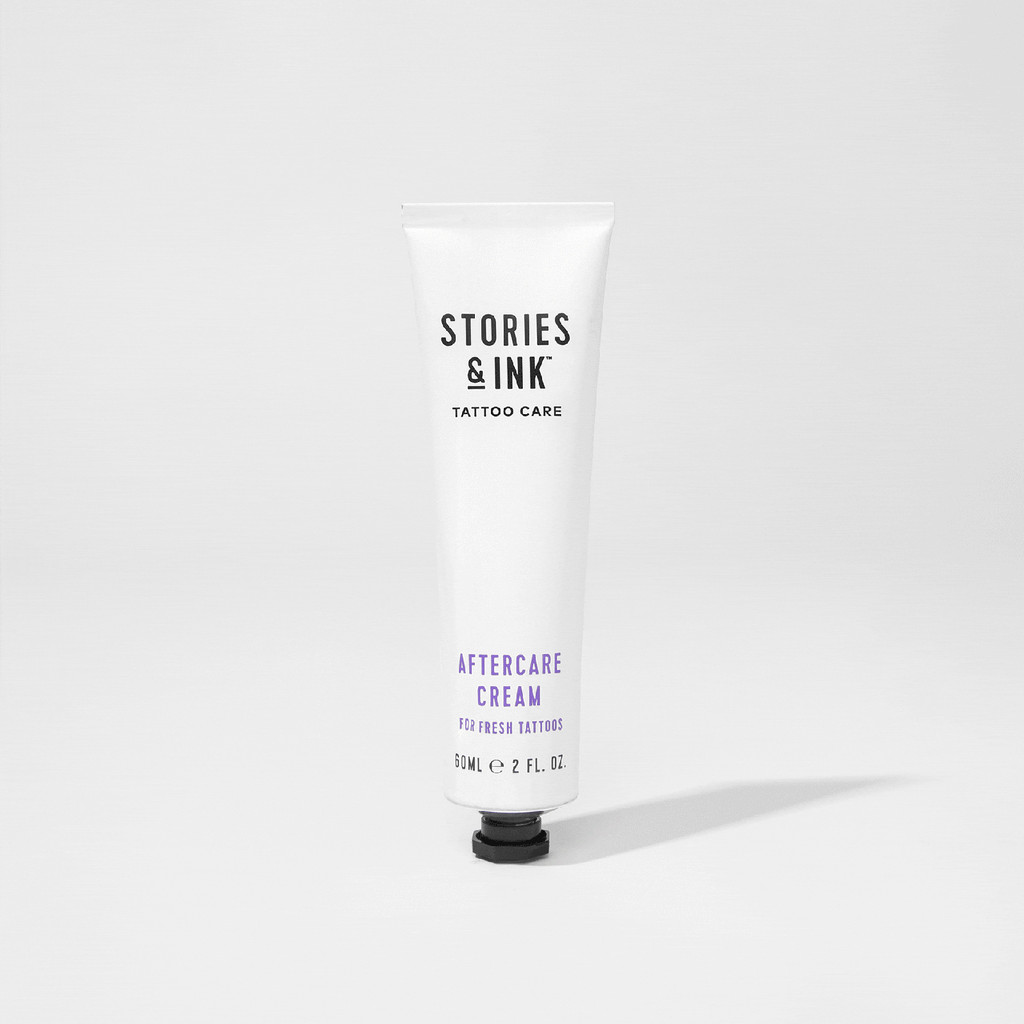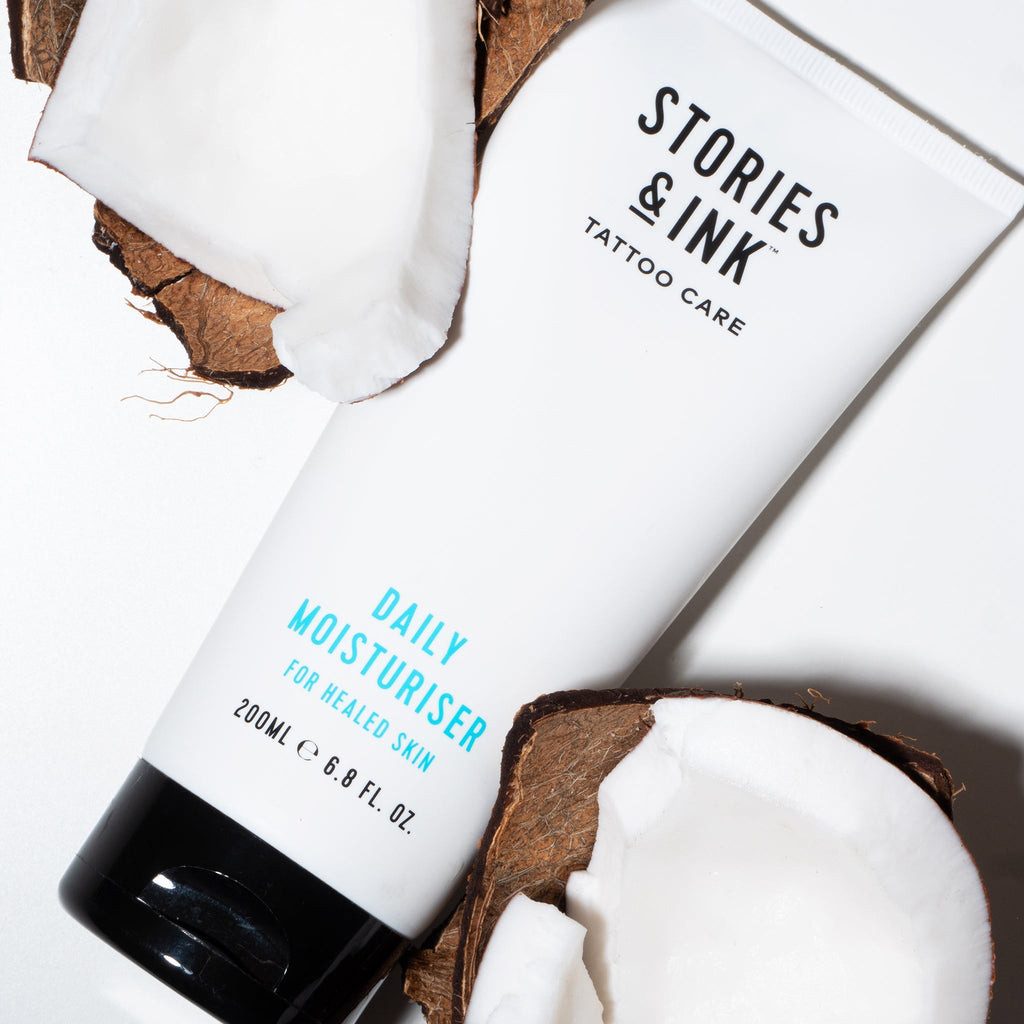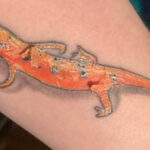How Long Does Tattoo Itch Last? Tattoo itching is a common part of the tattoo healing journey, but understanding why it happens and what you can do about it is key to a comfortable recovery. At tattooat.com, we provide valuable insights and solutions to help you navigate this phase and keep your tattoo looking its best. Learn about tattoo aftercare, healing process and effective remedies to soothe your skin.
1. Understanding Tattoo Itching
Tattoo itching is the irritating sensation that makes you want to scratch a fresh or healed tattoo. It’s a normal part of how your body repairs itself after getting inked. The level of itching can vary, but knowing what causes it can help you manage it effectively.
What Exactly is Tattoo Itching?
Tattoo itching is the annoying sensation of needing to scratch the skin around a new or old tattoo. It is a natural physiological response to the skin’s healing process and can be influenced by several factors. During the tattoo healing phase, the damaged skin undergoes regeneration, which can trigger the release of histamine, leading to itching.
Why Does a Tattoo Itch?
Several factors contribute to tattoo itching:
- Healing Process: As the skin repairs itself, it goes through stages like scabbing, peeling, and regeneration.
- Immune Response: The body’s reaction to tattoo ink can trigger histamine release, causing itching.
- Skin Irritation: Dryness, friction from clothing, or irritants in soaps or lotions can exacerbate itching.
- Allergic Reactions: In some cases, the skin may react allergically to the tattoo ink or aftercare products, leading to intense itching and inflammation.
- Infection: Although less common, an infected tattoo can cause severe itching, redness, swelling, and pus.
2. How Long Will Tattoo Itching Persist?
The duration of tattoo itching varies, but it typically lasts for a specific period during the healing phase. Understanding this timeline can help you manage your expectations and provide appropriate care to alleviate the itching.
Typical Timeline for Tattoo Itching
Tattoo itching usually lasts from 1 to 3 weeks. However, this can vary based on individual healing rates, tattoo size, location, and aftercare practices. Here’s a general breakdown:
- First Week: Itching starts as the initial inflammation subsides and the skin begins to heal.
- Second Week: Itching often intensifies as scabs form and the skin regenerates.
- Third Week: Itching gradually decreases as the outer layers of skin heal and scabs start to fall off naturally.
Factors Affecting Itching Duration
Several factors can influence how long your tattoo itches:
- Individual Healing Rate: Everyone’s body heals at its own pace.
- Tattoo Size and Location: Larger tattoos or those in areas with more friction may itch longer.
- Aftercare Practices: Proper cleaning and moisturizing can reduce itching.
- Skin Sensitivity: People with sensitive skin may experience prolonged itching.
- Ink Type: Certain ink types may cause more irritation than others.
- Overall Health: Your general health and immune system strength can affect healing time.
 Woman carefully moisturizing her new tattoo
Woman carefully moisturizing her new tattoo
When to Be Concerned
While itching is normal, watch out for signs of infection or allergic reaction:
- Excessive Redness and Swelling: More than usual inflammation around the tattoo.
- Pus or Drainage: Any discharge from the tattoo area.
- Fever or Chills: Systemic signs of infection.
- Severe Pain: Disproportionate pain that increases over time.
- Hives or Rash: Allergic reaction to the ink or aftercare products.
If you experience any of these symptoms, seek medical advice immediately.
3. Distinguishing Normal Itching From Potential Problems
It’s crucial to differentiate between normal tattoo itching, which is a natural part of the healing process, and itching that may indicate underlying issues such as infection or allergic reactions. Recognizing the signs and symptoms of each will enable you to take appropriate action and ensure proper care for your tattoo.
Normal Tattoo Itching vs. Infection
Normal tattoo itching is usually mild to moderate and occurs as the skin heals. It is often accompanied by other signs of healing, such as:
- Peeling: The tattooed skin sheds its outer layers, similar to a sunburn.
- Slight Redness: Mild redness around the tattoo that gradually diminishes.
- Tenderness: Some sensitivity to the touch, especially during the initial days after getting the tattoo.
In contrast, itching caused by an infected tattoo is typically more severe and accompanied by concerning symptoms like:
- Increased Pain: Intense discomfort that worsens over time.
- Swelling: Pronounced swelling around the tattoo site.
- Redness: Extensive redness that spreads beyond the tattooed area.
- Pus or Drainage: Oozing of yellowish or greenish fluid from the tattoo.
- Fever or Chills: Systemic symptoms indicating a more serious infection.
If you suspect an infection, seek immediate medical attention to prevent complications.
Normal Tattoo Itching vs. Allergic Reactions
Normal tattoo itching is a temporary sensation that subsides as the tattoo heals. It is not associated with other allergic symptoms. However, an allergic reaction to tattoo ink or aftercare products can cause persistent and intense itching, along with:
- Rash: Development of small, raised bumps or blisters around the tattoo.
- Hives: Raised, itchy welts that may appear and disappear intermittently.
- Inflammation: Significant redness, swelling, and tenderness around the tattoo.
- Difficulty Breathing: In rare cases, severe allergic reactions can cause breathing difficulties, requiring immediate medical intervention.
If you experience any signs of an allergic reaction, discontinue use of any aftercare products and consult a healthcare professional for appropriate treatment.
4. Effective Ways to Relieve Tattoo Itching
Finding effective ways to relieve tattoo itching is essential to prevent scratching, which can damage the healing skin and increase the risk of infection. Here are some tried-and-true methods to soothe your itchy tattoo and promote proper healing:
Immediate Relief Strategies
- Apply a Cold Compress: Applying a cold compress or ice pack wrapped in a clean cloth can provide immediate relief from itching. The cold temperature helps numb the nerve endings and reduce inflammation.
- Gently Pat the Area: Instead of scratching, gently pat or tap the itchy area with your fingertips. This provides a distracting sensation without damaging the healing skin.
- Moisturize Regularly: Keeping the tattooed skin moisturized helps prevent dryness and itching. Apply a thin layer of fragrance-free, hypoallergenic tattoo aftercare lotion or ointment recommended by your tattoo artist.
- Wear Loose Clothing: Opt for loose-fitting, breathable clothing to minimize friction and irritation on the tattooed skin. Tight clothing can trap moisture and exacerbate itching.
Long-Term Care Tips
- Keep the Area Clean: Wash your tattoo gently with mild, fragrance-free soap and lukewarm water. This helps remove any irritants that may contribute to itching.
- Avoid Irritants: Stay away from scented lotions, perfumes, or products containing alcohol, as they can irritate the skin and exacerbate itching.
- Stay Hydrated: Drinking plenty of water helps keep your skin hydrated from the inside out, reducing dryness and itching.
- Protect from Sun Exposure: Overexposure to the sun’s UV rays can cause dryness and further irritate the tattoo, leading to itching. Shield your tattooed skin with clothing or a broad-spectrum sunscreen with a high SPF when spending time outdoors.
- Avoid Swimming and Soaking: Refrain from swimming in pools, hot tubs, or other bodies of water, as they can expose the tattoo to bacteria and irritants, increasing the risk of infection and itching.
When to Seek Professional Advice
If your tattoo itching persists or is accompanied by other concerning symptoms, it’s essential to consult a healthcare professional or experienced tattoo artist. They can assess your condition and provide appropriate guidance and treatment.
5. What Not to Do When Your Tattoo Itches
To ensure proper healing and prevent complications, it’s crucial to avoid certain actions that can worsen tattoo itching or compromise the integrity of your new ink.
The Biggest No-No: Scratching
Scratching your tattoo is the biggest mistake you can make. It can:
- Introduce Bacteria: Your fingernails harbor bacteria that can cause infection.
- Damage the Skin: Scratching can tear the healing skin, leading to scarring.
- Delay Healing: It disrupts the healing process, prolonging itching and discomfort.
- Affect Tattoo Appearance: Scratching can cause ink loss and distortion of the tattoo design.
Other Practices to Avoid
- Picking Scabs: Let scabs fall off naturally. Picking them can cause scarring and ink loss.
- Using Harsh Soaps or Lotions: These can irritate the skin and prolong itching.
- Wearing Tight Clothing: Tight clothes can rub against the tattoo and increase irritation.
- Over-Moisturizing: Too much moisture can trap bacteria and lead to infection.
- Sun Exposure: UV rays can damage the tattoo and cause itching.
 Close-up of tattoo aftercare cream for daily use
Close-up of tattoo aftercare cream for daily use
Why These Precautions Matter
Following these guidelines is crucial for:
- Preventing Infection: Keeping the area clean and avoiding scratching reduces the risk of bacterial infections.
- Ensuring Proper Healing: Allowing the skin to heal naturally without interference promotes optimal results.
- Maintaining Tattoo Quality: Avoiding harsh products and sun exposure helps preserve the vibrancy and clarity of the tattoo.
6. Special Considerations for Old Tattoos
Old tattoos can also experience itching, often due to dryness, allergies, or environmental factors. Understanding the specific needs of older tattoos and providing appropriate care can help alleviate itching and maintain their appearance.
Why Old Tattoos Itch
- Dry Skin: Over time, the skin’s natural moisture barrier can weaken, leading to dryness and itching.
- Allergies: Allergic reactions to certain fabrics, detergents, or skincare products can cause itching on or around old tattoos.
- Sun Exposure: Prolonged sun exposure can damage the ink and cause the skin to become dry and irritated, resulting in itching.
- Weather Changes: Seasonal changes, especially during winter months, can lead to dry skin and increased itching.
How to Care for Itchy Old Tattoos
- Moisturize Regularly: Apply a fragrance-free, hypoallergenic moisturizer to keep the skin hydrated and prevent dryness.
- Avoid Harsh Chemicals: Stay away from scented lotions, perfumes, or products containing alcohol, as they can irritate the skin and exacerbate itching.
- Protect from Sun Exposure: Shield your tattooed skin with clothing or a broad-spectrum sunscreen with a high SPF when spending time outdoors.
- Consider Antihistamines: If your old tattoo itching is persistent and severe, consult a healthcare professional about taking over-the-counter antihistamines. These medications can help reduce itching caused by allergic reactions or histamine release.
- Avoid Scratching: As with new tattoos, resist the urge to scratch. Scratching can damage the skin, cause scabbing, and potentially impact the tattoo’s appearance.
When to See a Professional
If your old tattoo itching persists or is accompanied by other concerning symptoms, such as redness, swelling, or pus, it’s essential to consult a dermatologist or tattoo artist for further guidance. They can assess your condition and recommend appropriate treatment options.
7. Choosing the Right Tattoo Aftercare Products
Selecting the right tattoo aftercare products is essential for promoting proper healing, minimizing itching, and maintaining the vibrancy of your tattoo.
Key Ingredients to Look For
When choosing tattoo aftercare products, consider the following key ingredients:
- Moisturizers: Look for ingredients like shea butter, cocoa butter, and jojoba oil to keep the skin hydrated and prevent dryness.
- Soothing Agents: Ingredients like aloe vera, chamomile, and calendula can help soothe irritated skin and reduce itching.
- Antimicrobials: Products containing antimicrobial agents like tea tree oil or chlorhexidine can help prevent infection.
- Humectants: Humectants like glycerin and hyaluronic acid attract moisture to the skin, keeping it hydrated and supple.
- Emollients: Emollients like petrolatum and lanolin create a protective barrier on the skin, preventing moisture loss.
Ingredients to Avoid
Certain ingredients can irritate the skin and prolong the healing process. Avoid products containing:
- Fragrances: Artificial fragrances can cause allergic reactions and irritate sensitive skin.
- Alcohol: Alcohol can dry out the skin and delay healing.
- Dyes: Artificial dyes can cause allergic reactions and irritate the skin.
- Parabens: Parabens are preservatives that can disrupt hormone function and irritate the skin.
- Petroleum-Based Products: Petroleum-based products can clog pores and prevent the skin from breathing.
Recommended Products
- Stories & Ink Aftercare Cream: This cream is hypoallergenic, fragrance-free, 100% vegan, and cruelty-free, making it an excellent choice for tattoo aftercare.
- Stories & Ink Daily Moisturizer: This moisturizer keeps tattoos hydrated and is appropriate for all skin types.
 Stories & Ink Daily Moisturiser product shot
Stories & Ink Daily Moisturiser product shot
8. Tattoo Itching and Seasonal Changes
Seasonal changes can significantly impact tattoo itching, as fluctuations in temperature and humidity can affect the skin’s moisture levels and overall health.
Winter Woes: Dryness and Itching
During winter months, the air tends to be drier, both indoors and outdoors, due to heating systems and cold weather conditions. This can lead to dry skin, which is a common cause of itching, especially for tattoos.
- Combat Dryness: To combat dryness and itching during winter, moisturize your tattoo regularly with a fragrance-free, hypoallergenic moisturizer.
- Use a Humidifier: Consider using a humidifier to add moisture to the air, especially in your bedroom, to prevent your skin from drying out overnight.
- Avoid Hot Showers: Hot water can strip the skin of its natural oils, exacerbating dryness. Opt for lukewarm showers and limit the duration to minimize moisture loss.
Summer Sensitivities: Sun and Sweat
During summer months, increased sun exposure and sweating can also contribute to tattoo itching. Sunburn can damage the skin and cause inflammation, while sweat can irritate the skin and trap bacteria, leading to itching.
- Protect from Sun: Shield your tattooed skin with clothing or a broad-spectrum sunscreen with a high SPF when spending time outdoors.
- Stay Hydrated: Drink plenty of water to keep your skin hydrated from the inside out, reducing dryness and itching.
- Cleanse Regularly: Wash your tattoo gently with mild, fragrance-free soap and lukewarm water to remove sweat and bacteria that can cause irritation.
- Wear Breathable Clothing: Opt for loose-fitting, breathable clothing to minimize friction and allow air to circulate, preventing sweat from accumulating on the skin.
Adapting Your Routine
Adjust your tattoo aftercare routine based on the season to address the specific challenges posed by each time of year. During winter, focus on moisturizing and hydration, while during summer, prioritize sun protection and cleanliness.
9. Tattoo Itching and Underlying Skin Conditions
In some cases, tattoo itching may be related to underlying skin conditions such as eczema or psoriasis. Understanding the connection between these conditions and tattoo itching is crucial for effective management.
Eczema and Tattoos
Eczema, also known as atopic dermatitis, is a chronic skin condition characterized by inflammation, itching, and dry, scaly skin. People with eczema may experience increased itching in and around their tattoos, especially during flare-ups.
- Manage Eczema: To manage eczema-related tattoo itching, follow your dermatologist’s recommendations for treating eczema, including using prescribed topical corticosteroids or other medications.
- Moisturize Regularly: Keep the tattooed skin moisturized with a fragrance-free, hypoallergenic moisturizer to prevent dryness and itching.
- Avoid Irritants: Stay away from scented lotions, perfumes, or products containing alcohol, as they can irritate the skin and exacerbate eczema symptoms.
Psoriasis and Tattoos
Psoriasis is another chronic skin condition characterized by red, scaly patches on the skin. Similar to eczema, psoriasis can cause increased itching in and around tattoos, especially during flare-ups.
- Manage Psoriasis: To manage psoriasis-related tattoo itching, follow your dermatologist’s recommendations for treating psoriasis, including using prescribed topical or systemic medications.
- Avoid Trauma: Protect the tattooed skin from trauma or injury, as this can trigger psoriasis flare-ups.
- Moisturize Regularly: Keep the tattooed skin moisturized with a fragrance-free, hypoallergenic moisturizer to prevent dryness and itching.
Consultation is Key
If you have an underlying skin condition like eczema or psoriasis, consult with your dermatologist before getting a tattoo. They can assess your skin and provide guidance on minimizing the risk of complications and managing any potential itching or irritation.
10. Debunking Common Myths About Tattoo Itching
Several myths and misconceptions surround tattoo itching, leading to confusion and misinformation. Let’s debunk some of these common myths to provide clarity and accurate information.
Myth 1: Itching Means the Tattoo is Healing Properly
While itching is often a sign of healing, it doesn’t necessarily mean that the tattoo is healing properly. Itching can also be caused by dryness, irritation, allergic reactions, or infection.
Myth 2: Scratching a Tattoo is Okay if You Do it Gently
Scratching a tattoo, even gently, can damage the healing skin and increase the risk of infection. It’s best to avoid scratching altogether and use alternative methods to relieve itching, such as patting or applying a cold compress.
Myth 3: All Tattoo Itching is the Same
Not all tattoo itching is the same. The intensity, duration, and accompanying symptoms can vary depending on the underlying cause, such as normal healing, dryness, allergic reaction, or infection.
Myth 4: Moisturizing a Tattoo Will Always Stop the Itching
While moisturizing can help relieve itching caused by dryness, it may not be effective for itching caused by other factors, such as allergic reactions or infection.
Myth 5: Old Tattoos Don’t Itch
Old tattoos can itch due to various reasons, including dryness, allergies, sun exposure, and weather changes. Proper care and maintenance are essential to prevent itching in old tattoos.
By debunking these common myths, we aim to empower you with accurate information to make informed decisions about your tattoo care and address any itching concerns effectively.
If you’re looking for inspiration for your next tattoo design or want to find a skilled tattoo artist in the United States, visit tattooat.com today. Explore our extensive collection of tattoo designs, discover talented artists, and read our informative articles on tattoo aftercare and maintenance.
FAQ: Tattoo Itching
- Why is my new tattoo so itchy?
Your new tattoo is itchy because the skin is healing itself. This process includes scabbing, peeling, and regeneration, all of which can cause itching. - Is it normal for a tattoo to itch like crazy?
Yes, it’s normal for a tattoo to itch intensely, especially during the second week of healing. However, if the itching is accompanied by excessive redness, swelling, or pus, seek medical advice. - What can I put on my tattoo to relieve itching?
You can apply a thin layer of fragrance-free, hypoallergenic tattoo aftercare lotion or ointment. Cold compresses can also provide temporary relief. - Can I use regular lotion on my tattoo?
It’s best to use a lotion specifically designed for tattoo aftercare. Regular lotions may contain fragrances or other ingredients that can irritate the skin. - How often should I moisturize my new tattoo?
Moisturize your new tattoo 2-3 times a day, or whenever the skin feels dry. - Can sun exposure make my tattoo itch more?
Yes, sun exposure can dry out the skin and further irritate a tattoo, leading to increased itching. Always protect your tattoo with clothing or sunscreen. - When should I see a doctor about my itchy tattoo?
See a doctor if you experience signs of infection, such as excessive redness, swelling, pus, fever, or chills. - Can allergies cause tattoo itching?
Yes, allergic reactions to tattoo ink or aftercare products can cause intense itching, rash, and inflammation. - What should I do if my old tattoo starts itching?
Moisturize regularly, avoid harsh chemicals, protect from sun exposure, and consider antihistamines if the itching is severe. - Does the location of my tattoo affect how much it itches?
Yes, tattoos in areas with more friction, such as the wrists or ankles, may itch more due to increased irritation.
